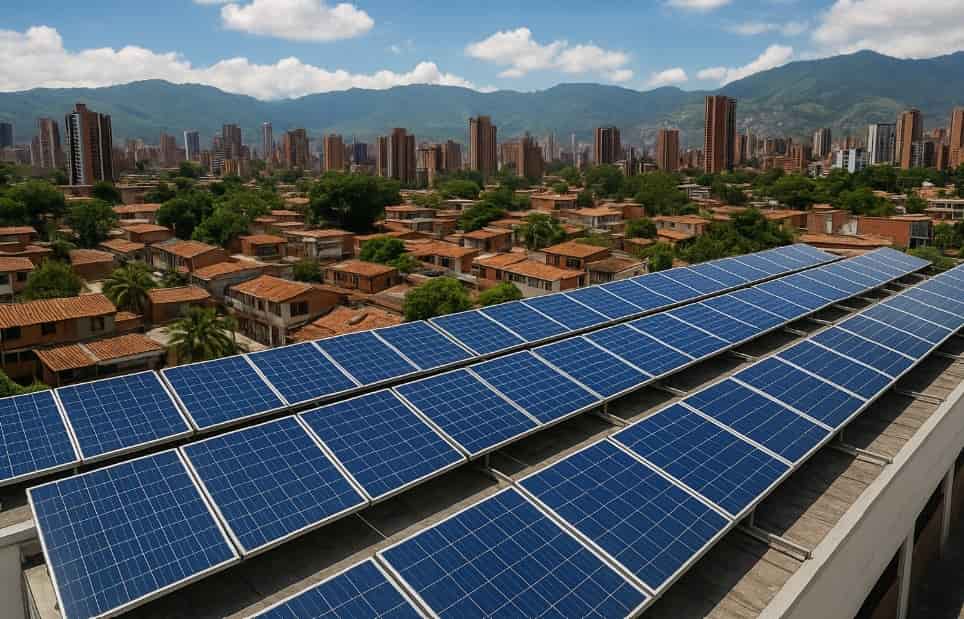

As global energy demand continues to rise, distributed photovoltaic (PV) generation has emerged as a key solution for achieving sustainable and decentralized power. In Latin America, Colombia has been steadily expanding its renewable energy capacity, with the city of Medellín—a vibrant urban hub surrounded by the Andes Mountains—leading the way in solar adoption. This case study explores how the integration of microinverter technology has enhanced energy efficiency, system reliability, and operational visibility in Medellín’s rooftop solar projects.
Located in the El Poblado district of Medellín, the pilot project consists of a 250 kW rooftop solar installation across multiple commercial buildings. The system was deployed by YT Elect Solar Solutions, a local engineering partner specializing in advanced inverter technologies.
The project aimed to:
Maximize rooftop energy yield under complex shading conditions
Improve system reliability and reduce downtime
Simplify operation and maintenance through module-level monitoring
Ensure safety compliance with Colombia’s RETIE electrical standards
To address the challenges of irregular rooftop layouts and partial shading from nearby structures, each PV module was paired with a microinverter. This architecture provided module-level maximum power point tracking (MPPT) and eliminated the traditional single point of failure associated with string inverters.
Key design parameters:
PV modules: 550 W monocrystalline panels
Microinverters: 2-in-1 high-efficiency units rated at 800 VA each
Monitoring platform: Cloud-based real-time performance dashboard
Communication: Power line carrier (PLC) for stable data transmission
Mounting system: Tilted aluminum rail structure optimized for Medellín’s latitude (6.2° N)
After six months of operation, data analysis revealed the following outcomes:
| Performance Metric | Traditional String Inverter | Microinverter System | Improvement |
|---|---|---|---|
| Energy yield (kWh/kWp/year) | 1,520 | 1,680 | +10.5% |
| System uptime | 97.2% | 99.8% | +2.6% |
| Maintenance cost (annual) | Baseline | −30% | Cost reduction |
| Module-level fault detection | Limited | Full diagnostics | Enhanced |
The microinverter system demonstrated a 10–11% increase in total energy production, primarily due to superior MPPT performance in partial shading and high ambient temperatures typical of Medellín’s climate.
The module-level monitoring proved to be a key differentiator. Technicians could remotely identify and address underperforming modules within hours, significantly reducing maintenance time. Additionally, the plug-and-play installation shortened deployment time by 20%, with no need for complex string configuration or DC combiner boxes.
Another crucial benefit was enhanced safety. Since microinverters convert DC to AC at the module level, rooftop DC voltages never exceeded 60 V, aligning with RETIE’s low-voltage safety requirements and reducing electrical hazard risks during maintenance or firefighting operations.
The Medellín installation offsets approximately 310 tons of CO₂ emissions per year, equivalent to planting over 5,000 trees. The system’s levelized cost of energy (LCOE) was calculated at $0.064 USD/kWh, making it competitive with local grid tariffs while delivering higher reliability.
The project’s success has encouraged neighboring municipalities such as Envigado and Bello to explore similar microinverter-based solar systems for commercial and residential applications.
The Medellín rooftop solar project demonstrates that microinverter-based PV systems can deliver tangible advantages in both performance and operational efficiency, especially in urban environments with shading, complex rooftops, and stringent safety standards.
As Colombia continues to advance its renewable energy transition, microinverters will play an increasingly important role in maximizing distributed generation potential, ensuring long-term reliability, and empowering energy independence at every rooftop. yy
Subscribe to us to enjoy event prices and get some of the best prices.
 IPv6 network supported
IPv6 network supported

